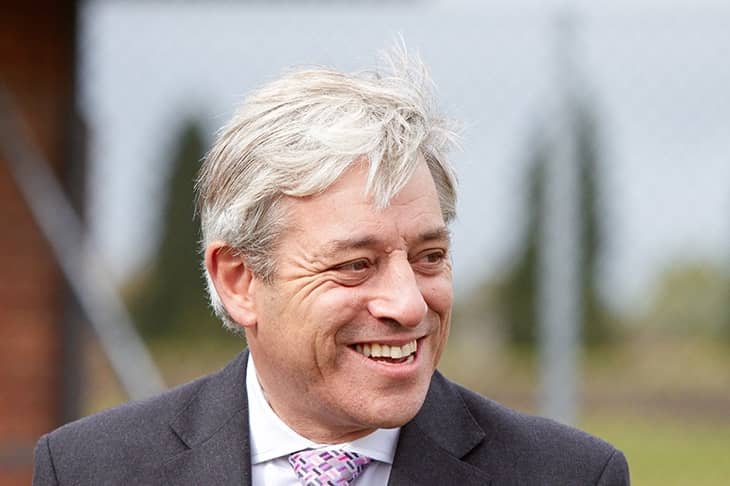Something has been bothering me of late, and that is my total lack of schadenfreude. The malicious pleasure at someone’s misfortune never counted a lot, but it’s now totally absent, and it worries me. Take, for example, the case of John Bercow, the preening popinjay show-off whose physical stature matches the respect he earned as Speaker. I can’t think of anyone I found more irritating, unfair and unfit for high office, yet now that he has been branded a liar, a bully and someone unwelcome even at Annabel’s, I feel no particular joy. His pompous self-regard brought about his comeuppance, but I have been denied the pleasure that Gore Vidal once described as ultimate. Looking back, I can’t think of many instances of characters falling on their faces that made me happy. Even on 5 March 1953, when Joe Stalin croaked, I was too busy worrying about the boy I was to wrestle that afternoon in the 133lb class. Ditto when Andreas Papandreou hit the dust; I figured he sort of meant well for lefties, after all. In Robert Maxwell’s case, however, all bets are off. His daughter Ghislaine is paying for her father’s sins, in a way, because however immoral she may be, she was yet one more Epstein victim.
Anyway, if we’re all going to be judged by what we leave behind, I’m the last one to talk. I used to work myself into a conniption whenever Bercow was pictured with his wife, the ostentatiously uxorious con man rubbing me up the wrong way, and now I cannot feel even the tiniest hint of pleasure. We humans are a strange bunch, infinitely complex, messy, irrational creatures. We ache for things or people and once we have them – nothing. Actually, as we get old we become caricatures of ourselves, a complicated network of neuroses and complexes.

Never mind. The vastness of people’s ego is hard to overstate. I had lunch with John Aspinall’s grandson Orson Fry last week, probably the best-looking young man making the rounds in London. But don’t get your hopes up, dears, he’s in love. Orson is planning an oral history of his grandfather, and it’s about time. Aspers was the most extraordinary man I ever met, his expertise in nature and animal life matched by no one. Yet he’s known for being a friend of Lord Lucan’s and for his casinos. When it comes to wild life and nature, Aspers could wipe the floor with most profs, and his historical knowledge would make Maurice Bowra flinch. He presented a caricature of himself to punters on purpose, but I had seen him in action with experts. He once invited Virginia McKenna to Howletts and she was sceptical. She believed animals should be born free. But once she saw what he had created, with wild animals free to roam and reproduce, she became a fan. Aspers gave two balls at Howletts and Port Lympne that put to shame other more famous parties given in Venice and Paris during the 1950s. When he bought Port Lympne, he showed me the visitors’ book, where Diana Cooper had written in the 1930s to the then owner Philip Sassoon: ‘Dear Sir Philip Baboon, hope to see you Sassoon.’ Sir Philip, apparently, was hairy.
Those were the days. I seem to be saying that quite a lot lately. Especially as most of my old London haunts have done a runner, although two riotous lunches chez les Bismarcks brought back pleasant drunken memories, and a Pugs dinner with our president Prince Pavlos, over for his Uncle Philip’s thanksgiving memorial, completed a perfect week.
As I’ve always insisted, Poland and Hungary are the two best nations of Europe, and they’ve proved it once again by keeping out 25-year-old male economic migrants and allowing in two million female and child refugees from Ukraine. Typically, the useless and cowardly EU chose this occasion to penalise Poland for choosing its own laws over those of unelected bureaucrats in Brussels. What else can one expect from Brussels but cowardice and bullying? The only thing the Poles need to do is return Adam Zamoyski’s passport because he is a national treasure, and I’m sure they will.
Last week I went to the Polish Club for a book launch and met the author Robert Gary Dodds. He has written an extraordinary book, The Life and Times of Alexander Hamilton: Two Apples That Fell From The Same Tree. There’s a foreword by the Duke of Hamilton and as I began reading it I thought back to the book I had just finished, a crappy Hollywood saga about an unpleasant family that traces three generations as if that were a great achievement. I suppose in Hollywood it is. From 1185 the Hamiltons helped shape Britain, as the great Alexander Hamilton did the US of A, a genealogy incomprehensible in most countries. Although Alexander Hamilton was a federalist, he was a great patriot and also a terrific womaniser. He died in a duel with Aaron Burr, vice-president of the US and a real shit. Vice-presidents have not improved since.







Comments